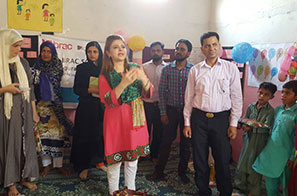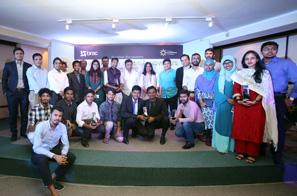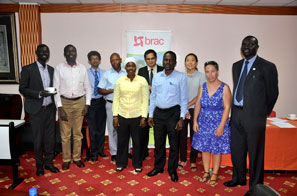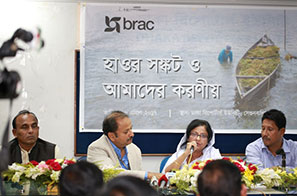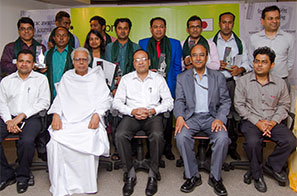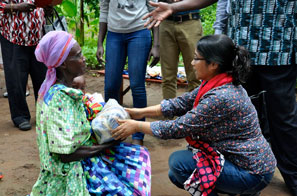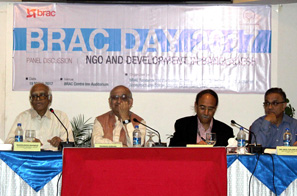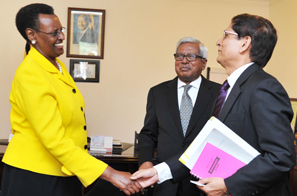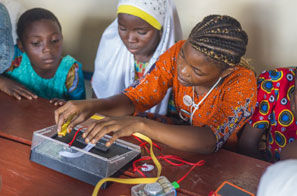
BRAC
Sindh Government official inaugurated BRAC school
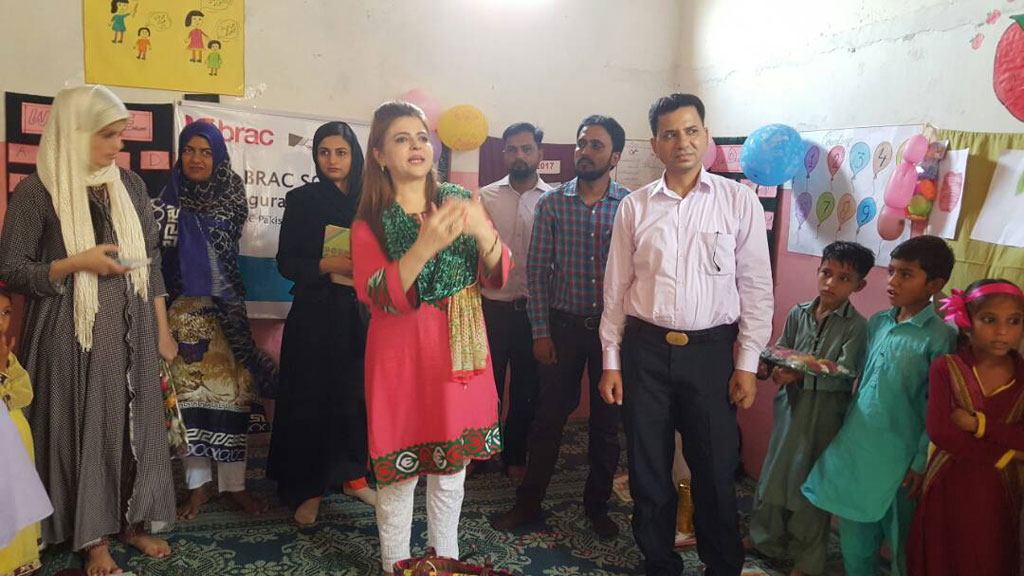 Dr. Fauzia Khan addressing learners in BRAC Primary school
Dr. Fauzia Khan addressing learners in BRAC Primary school
The additional secretary Government of Sindh and the head of curriculum wing of Sindh, Dr. Fauzia Khan, inaugurated a BRAC Primary school in Baldia Town, Karachi.
BRAC in Pakistan, with financial support from DFID, has established 300 non-formal schools for out-of-school, marginalised children in April 2017. 9,000 learners have been enrolled in Karachi, Khairpur and Kambar Shahdadkot districts of Sindh province.
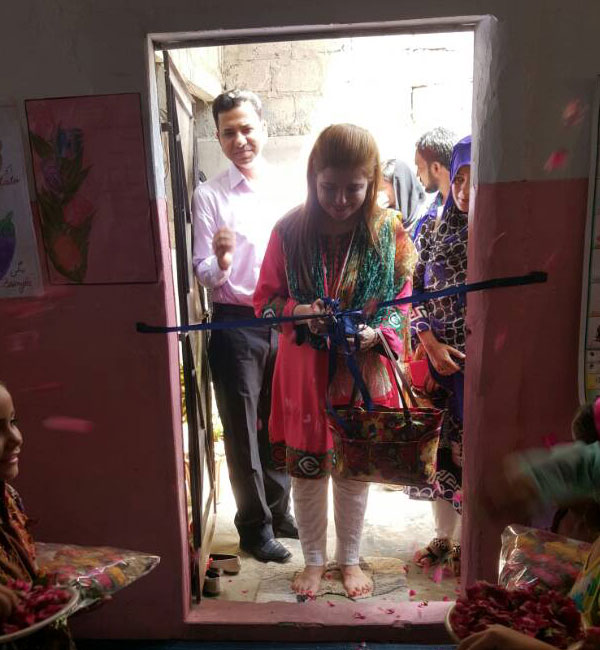 Dr. Fauzia Khan inaugurating the new school
Dr. Fauzia Khan inaugurating the new school
During the opening ceremony of the school, Dr. Khan appreciated BRAC's efforts to provide education to out-of-school children, especially girls. She addressed the community and parents, and she encouraged learners to put their heart and mind in their studies. She also welcomed new admissions to the school and met with the school management committee members. “This project will significantly improve the net enrolment rate of Sindh province," she exclaimed, and pledged to extended the full support of the Government of Sindh for the capacity building of BRAC’s teachers.
BRAC in Pakistan has started 1,500 primary schools and enrolled 46,566 out-of-school children in the rural and urban slum areas of Sindh. 5,493 learners were successfully graduated and mainstreamed into middle schools with the help of the Education and Literacy department of the Government of Sindh.
Urban innovation challenge announces 5 winners
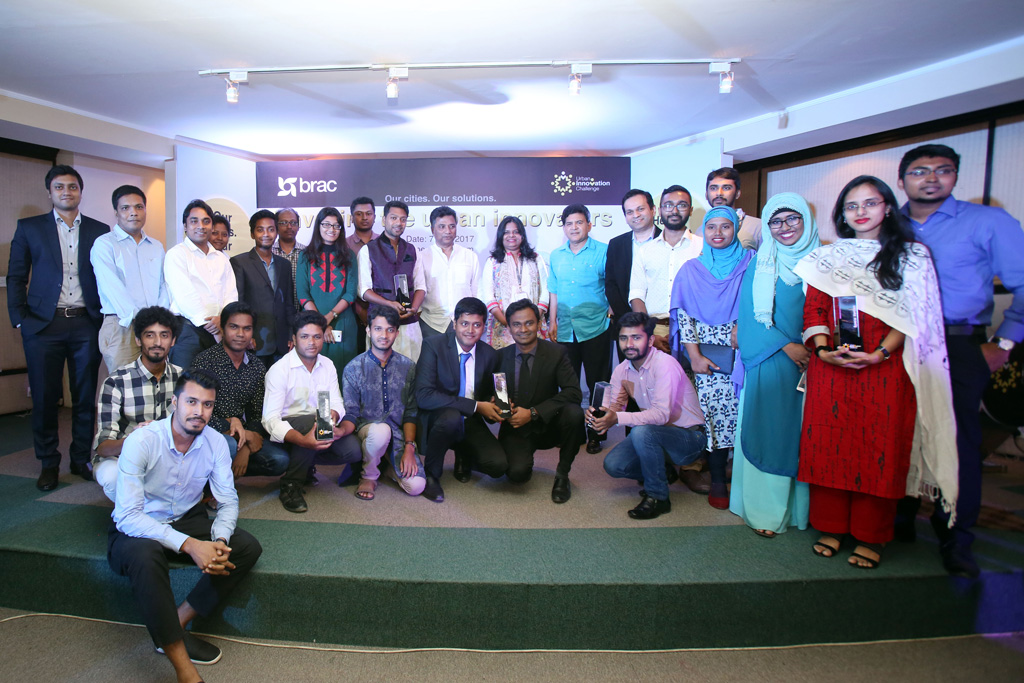
BRAC announced five winners for bringing innovative solutions to the growing challenges faced by the people living in cities across Bangladesh. The mayor of Dhaka North City Corporation (DNCC), Annisul Huq, announced the winners at an event organised at BRAC Centre today (7 May 2017).
Praising the initiative he said, “It’s wonderful to see the youth coming up with so many innovative ideas for the country. I really appreciate BRAC’s effort in creating a space and scope to incubate these innovations.” He also added, “The city corporation is always ready to support the new innovators to bring their ideas into effective solutions. We are hopeful for the results. Thanks to all the participants who joined the competition.”
Launched in October 2016, the competition created a platform for innovators, young entrepreneurs and university students to offer their solutions to the growing problems in urban areas. The three specific problem areas were: health, transportation and informal sector employment. The goal is to find the best ideas in Bangladesh and support innovators to build them into sustainable social enterprise models.
Around 600 applicants registered for the competition. 33 were short-listed for submitting full proposals. 13 teams were selected for the final round.
A jury of 5 experts including development practitioners and investors assessed the proposals on sustainability, relevance and human centricity of the design. Five teams are finally selected as winners. The winning teams are: Bhumijo and Bloodman in health category, Driver Mela and Servicing Campus in employment category and Amar Bike in transport category.
Winners will build their prototypes and test them in the field with BRAC in the next six months. They will receive mentoring, skills development and support, as well as a grant amount up to BDT 5 lac and linkage to potential investors.
The runners up of the competition are HealthSoc and The Neem Squad in health category, BlueSynaps, Team B and Unigigg in employment category and Barisal-1 and SmartTraffic in transport category. Identity Inclusion got special mention in health category.
Present as special guest, Executive Chairman of PPRC Dr Hossain Zillur Rahman said, “Innovation always works when there is an ecosystem. Innovative mind-set is another essential component of this system. I am happy that the competition was not Dhaka based, rather it was Bangladesh based, which proves that innovative mind-set is everywhere. We just need to give them a platform. The Urban Innovation Challenge not only ensured that platform but it also helped to produce responsible citizenship.”
In the concluding remarks, BRAC’s senior director Mr Asif Saleh said, “With our experience from the last 45 years, we can guide the young innovators to bring their ideas into a sustainable solutions. In order to do so, all of us the innovators, the mentors and the investors have to work together.”
Shout-Daily Star partnered the Urban Innovation challenge for youth engagement, Radio Shadhin for radio engagement, Beatnik for digital engagement and IDEO.ORG for knowledge management.
This competition was a part of BRAC’s newly launched urban development programme which focuses on improved service delivery, mobilisation and governance.
Sphere Standards Review
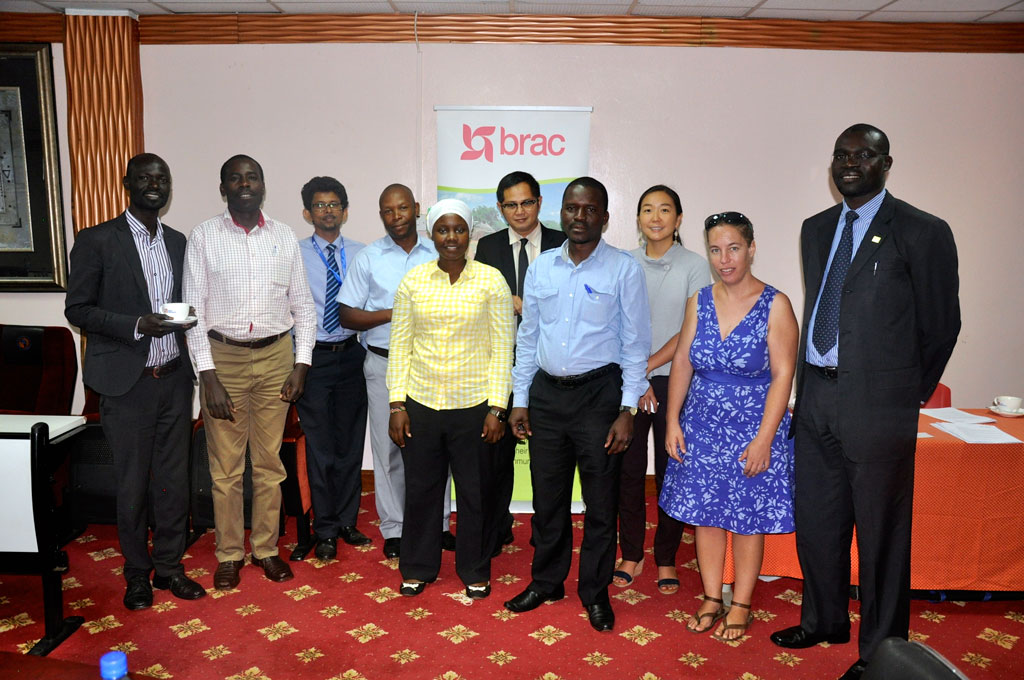 Participants at the Sphere Standards Review consultation convened by BRAC in Uganda
Participants at the Sphere Standards Review consultation convened by BRAC in Uganda
BRAC Uganda’s Emergency Response Programme organised a consultation workshop to review the Sphere Standards in Uganda on 12 April 2017, at Africana Hotel in Kampala.
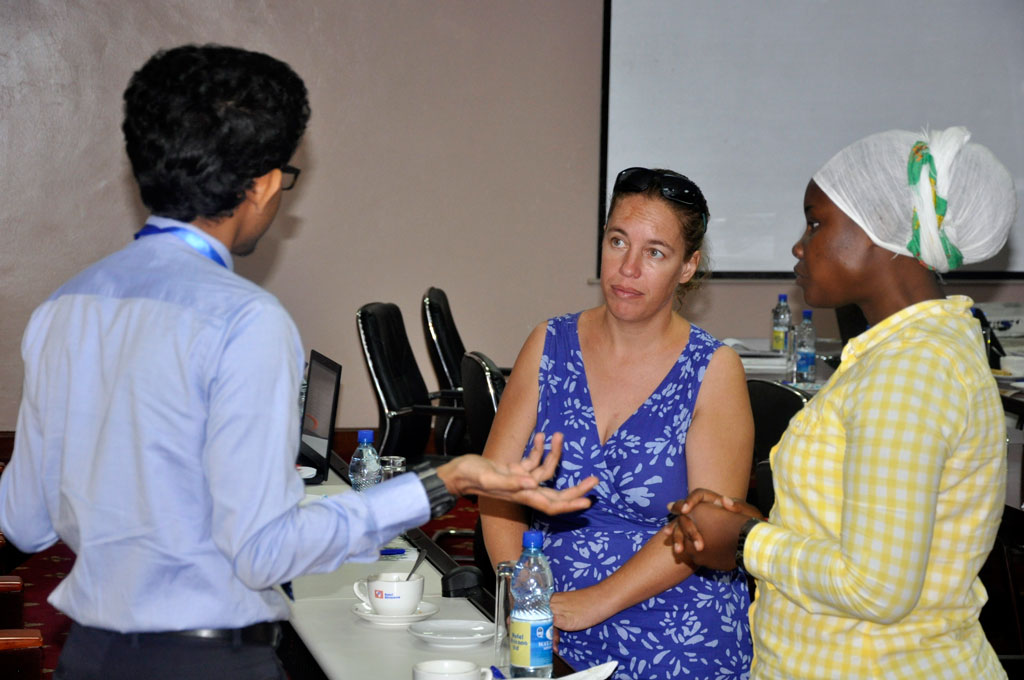
BRAC convened the meeting of development partners in Uganda, including UNDP, Adventist Development and Relief Agency (ADRA), Lutheran World Federation (LWF), War Child, Mercy Corps, Caritas and Catholic Relief Services, to share experiences from across different development sectors – food security and nutrition, WASH and health, shelter and non-food items, as part of a review exercise that will eventually feed into the overall global revision of the Sphere Handbook 2018 edition. According to the Sphere Project website, the year-long review and revision process offers opportunities for all users across the globe to engage and participate in the Handbook’s revision.
The Sphere Standards are the collective minimum set of principles that humanitarian actors agree to be guided by and harmonise the interpretation and execution of various interventions. The Standards stem from the Sphere Project - a voluntary initiative that brings a wide range of humanitarian agencies together around a common aim - to improve the quality of humanitarian assistance and the accountability of humanitarian actors to their constituents, donors and affected populations.
1-year postponement of waterbody lease demanded
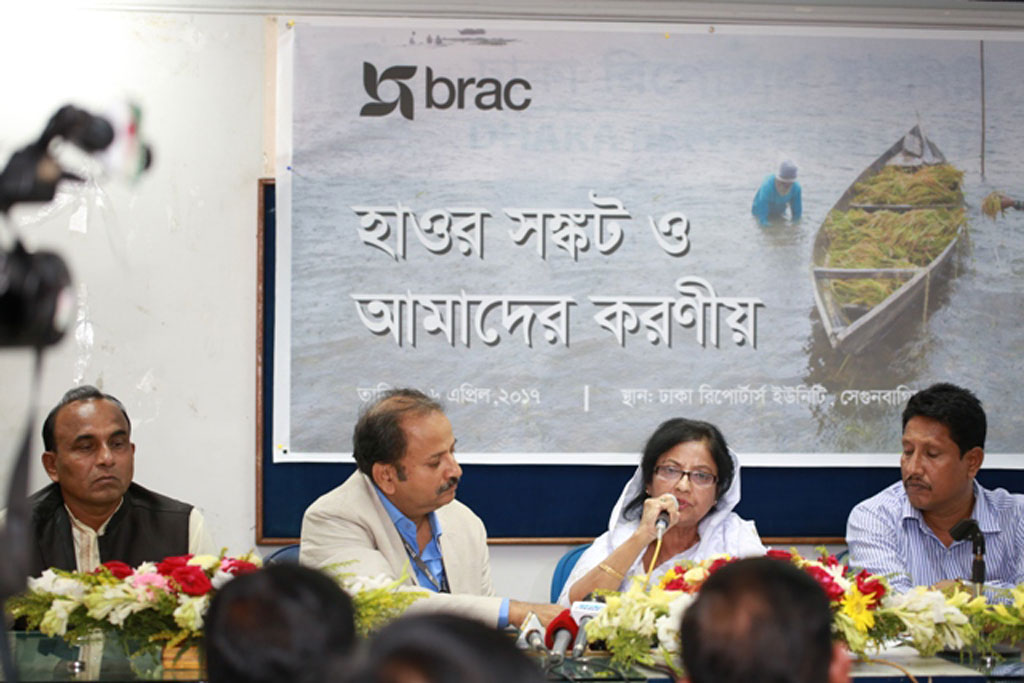
BRAC expressed today that it supports the demand of local communities for authorities to postpone the leases of haor waterbodies for one year and allow people affected by the current flooding to continue open-water fishing.
BRAC organised the press conference titled 'Haor crisis and our responsibilities' today on Wednesday (26 April 2017) at the Sagar-Runi Auditorium of Dhaka Reporter's Unity. BRAC arranged the press conference focusing on the responsibilities and plans to address the crisis on a long-term basis.
Joya Sengupta, lawmaker from the Sunamganj-2 constituency, Gawher Nayeem Wahra, director, BRAC Disaster Management and Climate Change programme, and KAM Morshed, director, Advocacy for Social Change, were present at the press conference. Representatives from the grassroots development organisations were also present at the event including, Nazmul Haque, executive director, Institute of Development Affairs (IEDA), MH Talha Chowdhury, executive director, Upama - Unnayan Parikalpanay Manush, and Muhammed Musa, executive director, Chetona Paribesh O Manob Unnayan Sangstha, Faruq Ahmed, chairman, Ashtogram union council, and Bidhan Chandra Chowdhury, chairman, Sulla union council.
Jaya Sengupta said, ‘The Ministry of Disaster Management and Relief has already started distributing relief in the haor area. We want other organisations to come forward to the aid of the affected people as BRAC is doing.’ She further warned that if the Water Development Board fails to take immediate measures to solve the waterlogging problem of the haor area such crises will return again.
Gawher Nayeem Wahra said, 'BRAC has already undertaken an emergency relief initiative for the five haor districts. Our initiative comprises distribution of fodder to 7,000 families and immediate assistance for 50 thousand families worth BDT 15 crore, but relief is not enough to solve this crisis. We need long-term planning with pragmatic solutions.'
Local public representatives expressed deep concern over the distribution of relief, saying that many people cannot collect the relief as they have not been properly informed of the time and place of distribution. They also demanded more budget allocation to ensure proper rehabilitation of those affected.
10 journalists get Migration Media Award
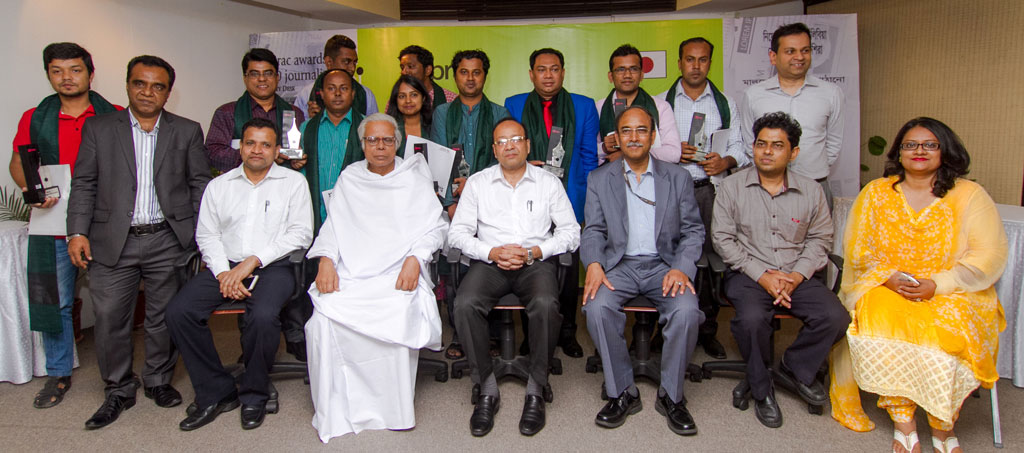
Ten media professionals received Migration Media Award 2016, an initiative of BRAC to recognise the media’s role in promoting safe migration through objective journalism. The awards were given at a ceremony organised today on Wednesday (12 April 2017) at the BRAC Centre in the Dhaka city.
The awardees are:
Print media – 1st – Belal Hossen Biplob, The Daily Star; 2nd - Adil Sakhawat, Dhaka Tribune; 3rd - Abu Jor Ansar Uddin Ahamod, The Daily Samakal.
Television report – 1st – Mashrequl Islam Rahat, Maasranga TV; 2nd – Sabina Yesmin, ATN News; 3rd – Meraj Hossen Gazi, Bangla Vision.
Television programme – 1st – Hassan Ahamed Chowdhury Kiron, for programme telecast on ATN Bangla.
Radio – 1st – Md Mustafizur Rahman, Bangladesh Betar.
Online – 1st – Md Shariful Islam Hasan, Daily Prothom Alo.
Local journalism – 1st – Faruque Ahmad, Trishal upazila correspondent, The Daily Ittefaq.
Additional secretary to the Ministry of Expatriates’ Welfare and Overseas Employment Jabed Ahmed attended the event as the chief guest with BRAC executive director Dr Muhammad Musa in chair. Noted writer and researcher Syed Abul Muksud was present as the special guest. The jury board members Syed Ishtiaque Reza, director news, 71 TV, Robaet Ferdous, associate professor, Department of Mass Communication and Journalism, Dhaka University, KM Ali Reza, deputy chief, Ministry of Expatriates’ Welfare and Overseas Employment, and Jasiya Khatoon, director, WARBE-DF, were also present. BRAC Senior director for strategy, communication and empowerment Asif Saleh moderated the event.
Additional secretary Jabed Ahmed said, ‘The government wants everyone who seeks to work abroad has skill training before migrating. But it is not easy, it is a challenging task.’
Writer and researcher Syed Abul Muksud said, ‘We should not blame the government for all that are going wrong with the migrant workers. To solve the issues the government along with individuals, civil society, recruiting agencies, NGOs and representatives from the international NGOs needs to work hand in hand.’
BRAC ED Dr Muhammad Musa called on the media professionals to focus in their work all the sides of the migrant workers’ life right from the pre-departure situations to their effort to reintegrate into the society after coming back home. Hassan Imam, programme head, BRAC Migration Programme, in his keynote paper also said the media can play an even more effective role by giving coverage to the issues migrant workers or those aspiring to go abroad face at all the phases including the realities they deal with after they return.
The 2nd National Stakeholders Workshop
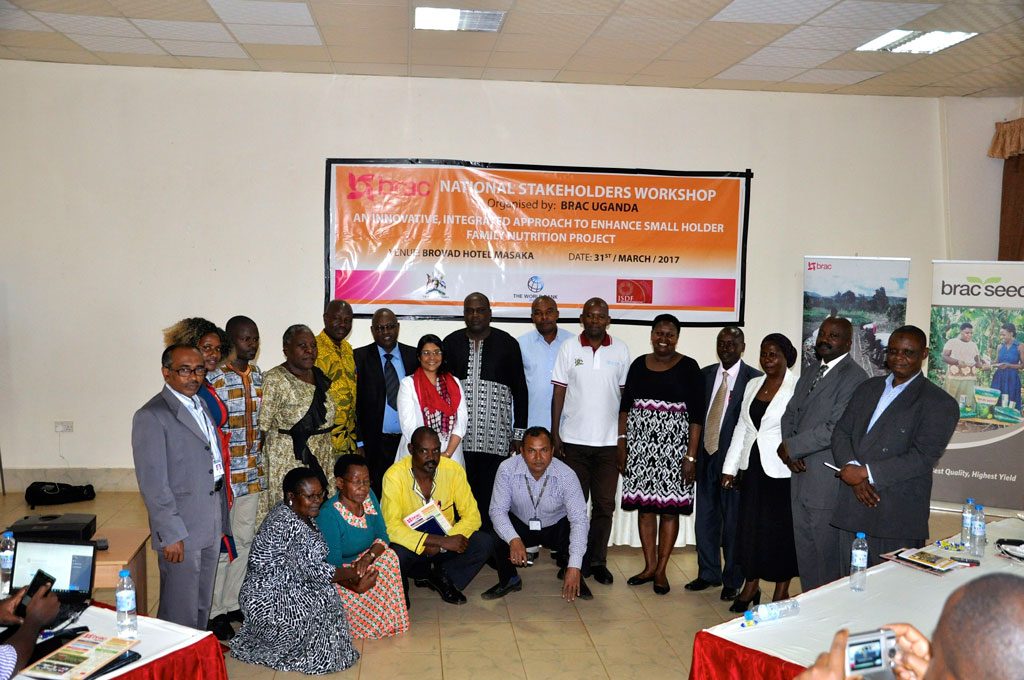 Participants at the JSDF Nutritional Project National Stakeholders Workshop
Participants at the JSDF Nutritional Project National Stakeholders Workshop
The Innovative, Integrated Approach to Enhance Smallholder Family Nutrition project, simply known as the JSDF Nutrition project, organised a stakeholder’s forum in Masaka Town, in central Uganda, to discuss nutrition and how to reduce cases of stunting among the project’s target population.
The workshop was presided over by Mr Ssansa Mugenyi, Director of Policy and Coordination at the Office of the Prime Minister. Mr Mugenyi chairs the JSDF Nutrition Project Steering Committee. Other members of the committee present were Agnes Baku, Ministry of Health, Alex Bambona, Ministry of Agriculture, and Dr. Goretti Semakula from the National Agriculture Research Organization. Stakeholders present at the half-day workshop included district health officers, district production and marketing experts, chief administrative officers and resident district commissioners, as well as farmers and BRAC volunteers.
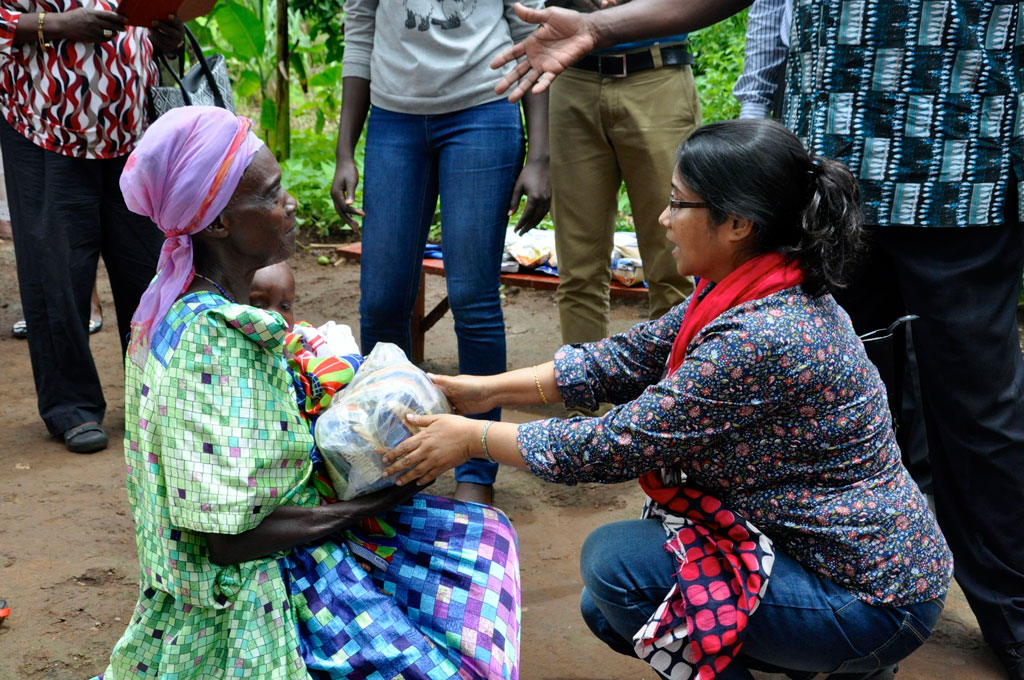 Hasina Akhter, the Country Representative for BRAC in Uganda, presents the mother of a malnourished child with fortified flour during a project health forum
Hasina Akhter, the Country Representative for BRAC in Uganda, presents the mother of a malnourished child with fortified flour during a project health forum
The previous day, the project steering committee conducted a field visit that included farmer training sessions, a health forum for mothers of under-2 children and a tour of an orange fleshed sweet potato farm.
The JSDF Nutrition project is a multisectoral intervention through which BRAC Uganda aims to improve the nutrition condition of 19,200 households in four districts through increasing the production and consumption of Vitamin-A rich foods, including the orange fleshed sweet potato (OFSP). The project combines BRAC’s agriculture, health and microfinance services and is funded by the Japan Social Development Fund (JSDF) through the World Bank.
NGO role can be crucial in tackling terrorism

While NGOs in Bangladesh are contributing to the socio-economic development, they can also play a significant role to curb the rising threat of terrorism. Government strategies and plans should create space for effective engagement of these organisations in this regard.
Speakers said these today on Sunday at a discussion titled 'NGO and development', organised at the BRAC Centre in the capital on the occasion of BRAC Day.
They also observed that creating an environment for comfortable co-existence of the government and the NGOs has become evermore important now.
Noted economist and chairman of Centre for Policy Dialogue Professor Rehman Sobhan was the chief guest at the programme.
Moderated and chaired by BRAC executive director Dr Muhammad Musa, the event was also attended among others by Professor Wahiduddin Mahmud, former adviser to Caretaker Government and executive director of CAMPE Rasheda K Choudhury, chief coordinator for SDG affairs at the prime minister's office Abul Kalam Azad and Professor SR Osmani of Ulster University in the UK.
Professor Rehman Sobhan stressed GO-NGO coordination in the pursuit of Sustainable Development Goals saying that the prime minister can have meetings with the NGOs regarding the implementation of programmes to achieve the SDGs.
He observed that ‘micro-credit’ programmes of the NGOs have played ‘remarkable’ role in poverty alleviation and BRAC, as one of the largest NGOs of the world, has played significant role in this regard. Having cited examples from similar initiative in India, he further suggested that following their examples social business enterprises in Bangladesh also can share their profit with their producers.
Professor Wahiduddin Mahmud observed that at present the relation between the government and NGOs is rather that of ‘an uneasy coexistence’. ‘I think this should be turned into a comfortable coexistence. The NGOs have played crucial role not only in poverty reduction, but also in education, health, family planning and increasing women’s participation in employment.’
‘There was a time when women could not ride bike. Nor could they go to school. There was mass reluctance about family planning. NGOs played a crucial role to change the situation. And as they did it, they have the capacity in tackling the rising religious terrorism. The government can particularly engage them in spreading the spirit of non-communalism,’ he further said.
Rasheda K Chowdhury called on the micro-credit practitioners to reduce interest rates and loan processing costs to increase the overall poverty-reduction efficiency of these programmes>
BRAC Research and Evaluation Division (RED) director Professor Abdul Bayes delivered the keynote presentation.
Citing government and donor data, he said between 2002 and 2016, one crore 10 lakh (11 million) households came out of ultra poverty. Of them, about 15 per cent - around 18 lakh (1.8 million) families have escaped ultra poverty with the integrated assistance from BRAC.
He further said, 90 per cent of those who came out of ultra poverty with BRAC assistance have done so by securing sustainable development. Besides reducing ultra poverty, BRAC also significantly contributes to the national management of tuberculosis infection, medical treatment of cataract and ensuring of quality primary education.
He added that while through its micro-credit programme BRAC helps alleviate poverty, it also contributes to the social development of poor communities. It has so far, helped 30 lakh (3 million) people in the hard-to-reach areas sustainably access safe water, trained 5 crore (50 million) people across the country on maintaining a healthy life and supplied sanitary latrines in 3 crore (30 million) households.
Stressing the challenges of the NGO sector, the speakers said partnership between the government and NGOs should further deepen in the face of reducing foreign development aid, which will help secure finance for such organisations. Innovation of new social business enterprises can also become a potential strategy to increase their financial stability. Bangladeshi NGOs should come up with new management techniques and system also as the country is steadily progressing towards becoming a middle-income country, they further said. They emphasised that these organisations should also increase their capacity and transparency, while run social development programmes besides distributing micro loans.
Speakers from BRAC added that currently BRAC micro-credit has reached 50 lakh (5 million) clients. The organisation is now in the process of overhauling its programmes with special focus on reducing ultra poverty, quality improvement of pre-primary education, capacity building to sustainably tackle climate change impacts, increase quality of health and nutrition, youth employment and women empowerment.
Sir Fazle in Uganda
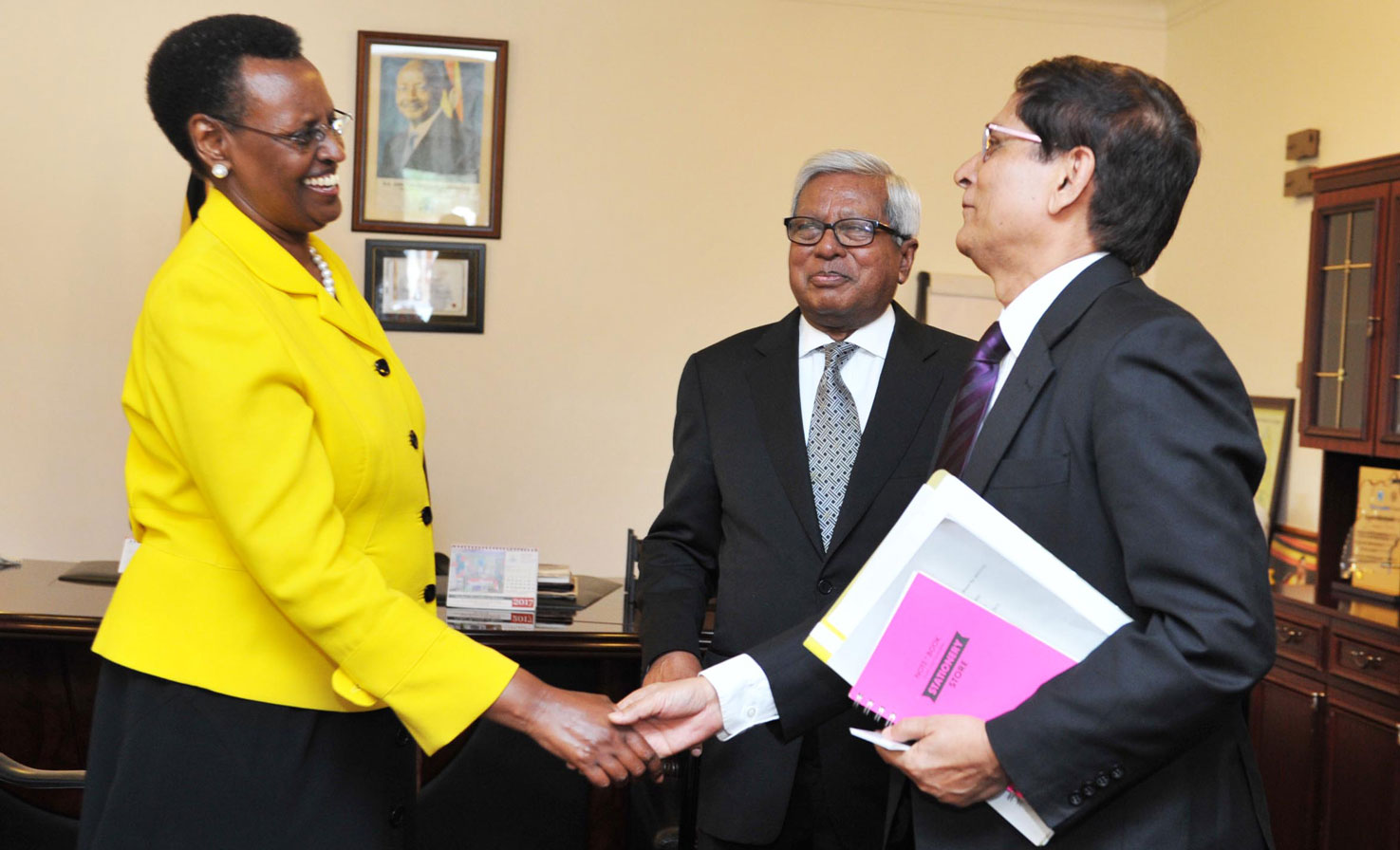
Sir Abed and Executive Director of BRAC International, Mr. Faruque Ahmed meeting Honorable Minister of Education and Sports and the First Lady of Uganda, Ms. Janet Kataha
Sir Fazle Hasan Abed visited Uganda from 11-16 March 2017. On his visit, he met various government officials including Janet Kataha, the first lady and the minister of education and sports; Dr Ruhakana Rugunda, prime minister of Uganda, and Matia Kasaija, minister of finance, economic planning and development. In addition, Sir Fazle interacted with various development partners including the World Bank country manager, Christina Malmberg Calvo; the Dutch Ambassador, Henk Jan Bakker, and representatives of UNICEF and UNFPA.
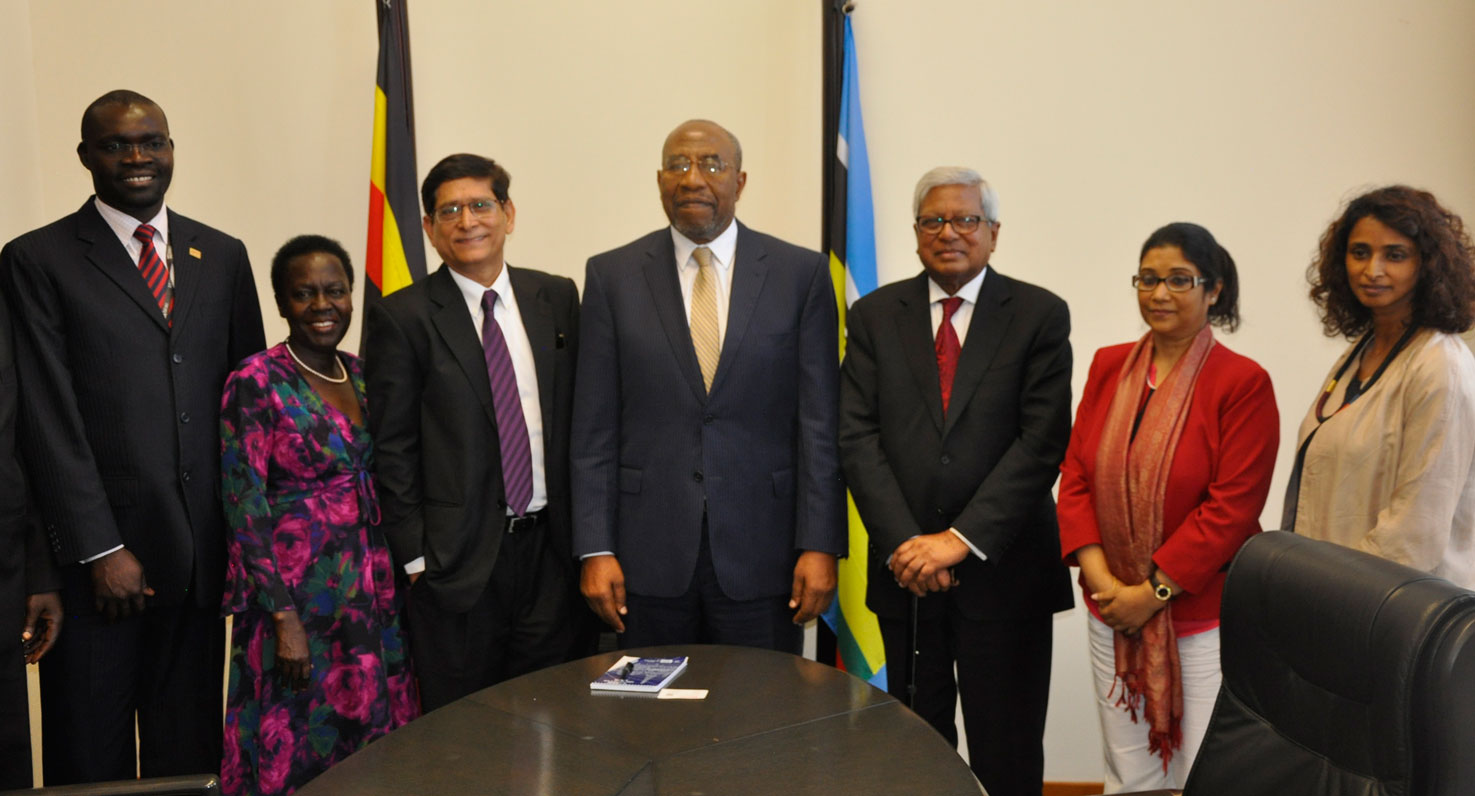
Sir Abed and senior staff of BI with Rt. Honorable Prime Minister of Uganda, Dr Ruhakana Rugunda
Sir Fazle also met prominent thinkers from the areas of agriculture, education, employment and development in Uganda.
BRAC Uganda hosted a networking dinner for Sir Fazle where representatives of development partners, universities, and the media were invited.
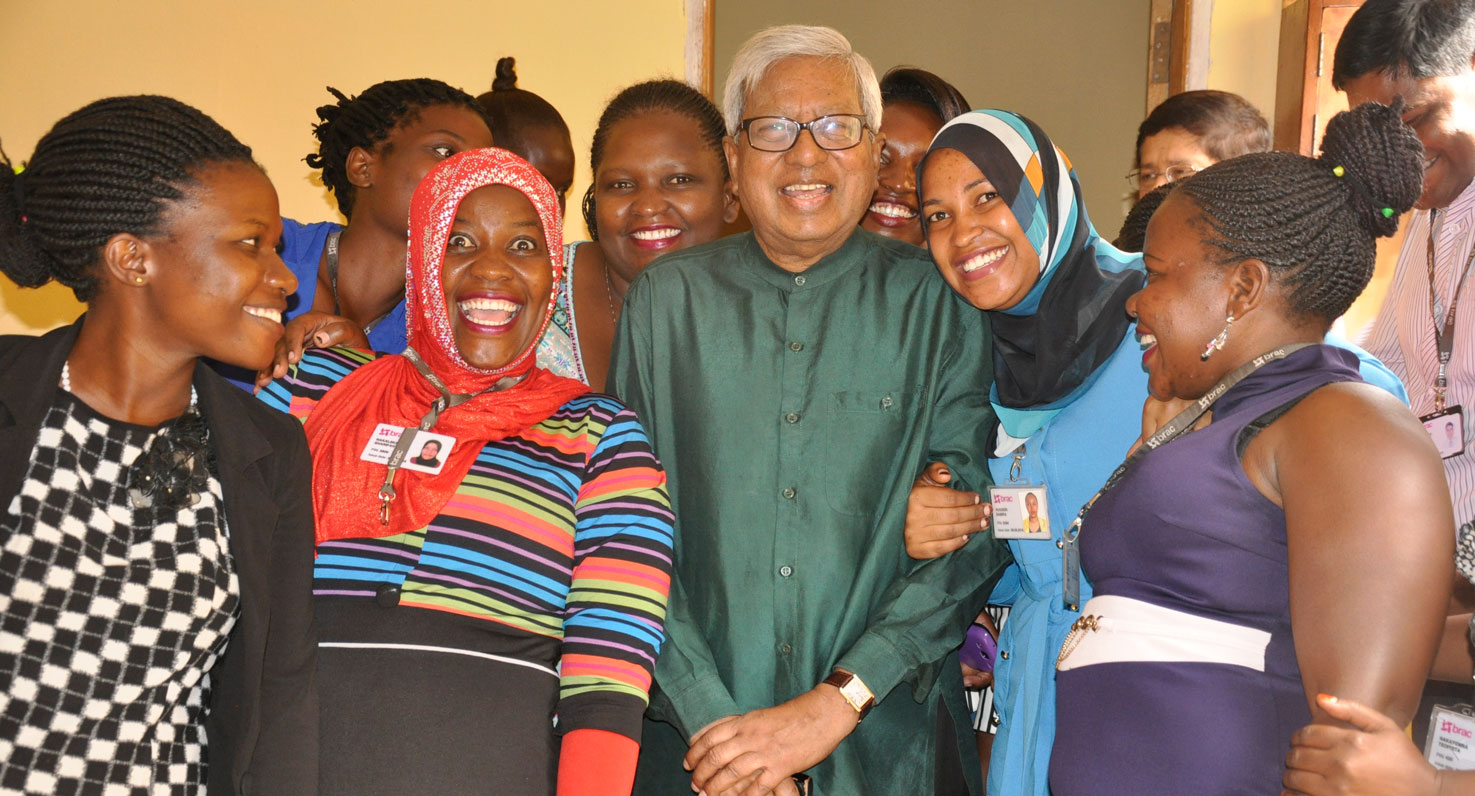
Sir Abed with BRAC Staff in Uganda
Sir Fazle also visited BRAC programmes. He visited Kasangati Branch Office, a microfinance group in Kasangati, two small enterprise clients, and St Julian High School, a partner school for the MasterCard Foundation Scholars Program at BRAC. He also visited the BRAC agriculture research and seed processing centre in Nakaseke.
BRAC Launched Innovative Code Clubs for Girls
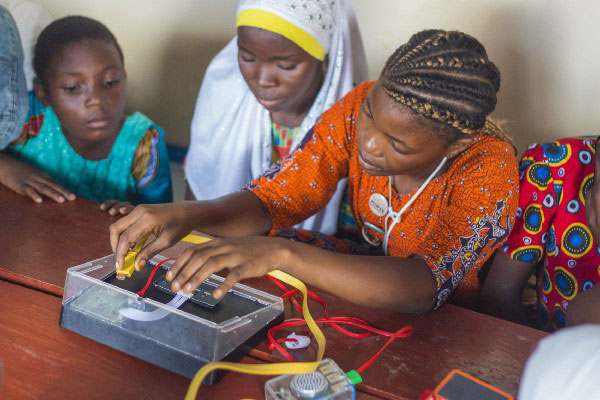
Aisha is a young, hopeful girl who wants to be a Fashion Designer. Dressed in a bright orange, breezy dress with her hair neatly tied back, she shows off the 3 badges pinned to her dress with pride. ‘Girls Code = Future’, reads the small, green badge.
The teacher then swiftly takes over and begins with an ice-breaker, asking the girls to say why they have joined the Code Clubs. Aisha explains that she wants to learn how to send e-mails and messages online. You can see the excitement and curiosity in her eyes as she waits for the lesson to begin.
“It is important for girls to learn about computers and access technology because later on in life they can be more independent,” says Aisha.
The girls are then handed out the pristine orange boxes that package the Kano kits. Carefully pealing the wrapping, Aisha pauses to take in the various gadgets and small parts before beginning to assemble the Kano computer by following the picture-book instructions.
Today is the first day Aisha will not only get to use a computer, but also learn how to build one. Typically, she spends her days staying at home to do the housework so coming to the Clubs is something for her to look forward to. BRAC in partnership with Theirworld, a global children’s charity are launching coding clubs project. Vulnerable girls and young women in Tanzania will be given unique chance to learn vital coding and technology skills in a safe space through this new innovative pilot project.
“The coding clubs will have a much broader impact in the girls’ lives that goes beyond just coding. The opportunities that coding will create for the girls in these communities are immeasurable. Most, if not all, have never even seen a computer before. An understanding of computer science is becoming increasingly essential in today’s world”. explained Amina Shaaban, the Deputy Manager for Education at BRAC
Girls and young women aged 11–25 years will learn how to build a computer, make games and artworks and express themselves with code. Integrated into the curriculum are also concepts of health and nutrition where girls reflect on their daily routines and the importance of hygiene, exercise and nutrition using online tools. The older girls also learn how to create their own websites using HTML, CSS & Java as well as gain skills for future employment and business. All girls are provided with a healthy snack.
Africa is crying out for young women with STEM skills and knowledge, coding clubs will provide these young girls a whole new window of opportunity and interest that they never had a chance to explore. Girls will be able to have a logical thought process, ability to spot mistakes and willingness to solve a problem that comes from learning to code. Said Ms. Shaaban
Code Clubs provide a safe space for girls to learn coding, foster their creative thinking and increase important business and health-related knowledge and skills to help transform their lives. The clubs are located in the Temeke district of Dar es Salaam where many girls have dropped out of school and the risk of teenage pregnancy is high.
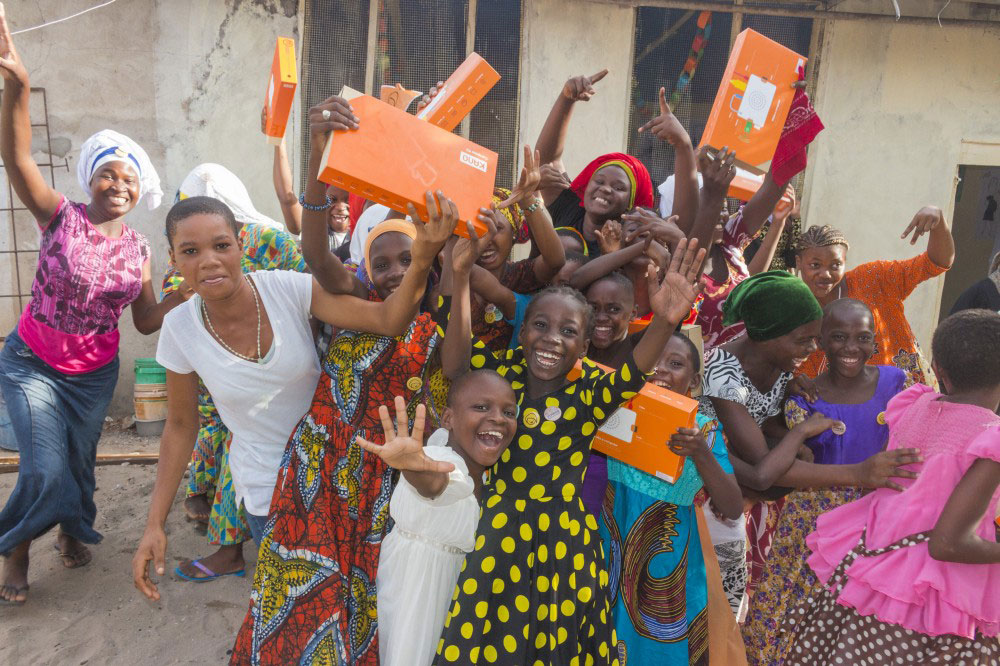
Sarah Brown, President of Theirworld says with a safe space to learn and play, a mentor to inspire, and access to technology to be able to explore, create, and code they can increase learning opportunities and empower girls to fulfill their potential.
Every girl should have the opportunity to go to school, learn, grow, and have a future they choose.
“At Theirworld, we know that investing in a girl has social and economic returns that go beyond her, extending not only to her family and future children, but also to her community. We don’t shy away from challenges and are prepared to tackle the big problems that stop children from learning,” added Sarah Brown.
Code Clubs run once a week in six month cycles. Girls will be taught a bespoke programme of online coding content by a trained teacher, and given access to numeracy, literacy, art and music to support their formal education. The Kano computer kits used in the clubs are low-cost, easily transportable, can be rebuilt multiple times and are highly applicable in countries where connectivity is low.
LEAD project improves livehoods
The four year project, which became to an end this month, has brought about tremendous impact to the poor farmers in 15 regions in the country.
Speaking at a dissemination workshop on LEAD project organised by BRAC Maendeleo in Dar es Salaam at the weekend the Minister of Agriculture and Fisheries Charles Tizeba praised the organisation for the concerted efforts to improve the livelihoods of Tanzanians.
He called upon various stakeholders to come up with projects to end poverty in various parts of the country and areas which no change yet had been realised.
According to him, boosting those poor farmers in remote rural areas was a recommendable job which other stakeholders should emulate.
“About 18 million Tanzanians are living in abject poverty so efforts are still needed to ensure that we remove them from the poverty line... and agriculture has been seen as a major way to go,” he said.
Tizeba called upon research organisations to invest on new maize seeds that were resistant drought and other climate change impacts.
For his part, BRAC Maendeleo country representative Rakibul Bari Khan said that the LEAD project had for the past four years worked to improve farming skills, facilitate linkages to farm inputs and markets as well as facilitating finance farmers through soft loans and grants.
He said that LEAD project implemented by the organisation was meant to facilitate agribusiness investment in the poultry and maize value chains in the country.
He said through the project, farmers could access both grants and loans and businesses could also apply for capital injections whereby it had disbursed at least USD 8.4 million as loans.
“The LEAD project, now in its fourth year of operation, has successfully facilitated to the formation of a total of 8021 producer groups, 89 agro-dealers have also trained.
The project has also addressed the constraints of high post-harvest losses in maize through establishment of purdue improved crops storage (PICS) bags and trained farmers with improved processing techniques,” he said.
Join the world’s biggest family

